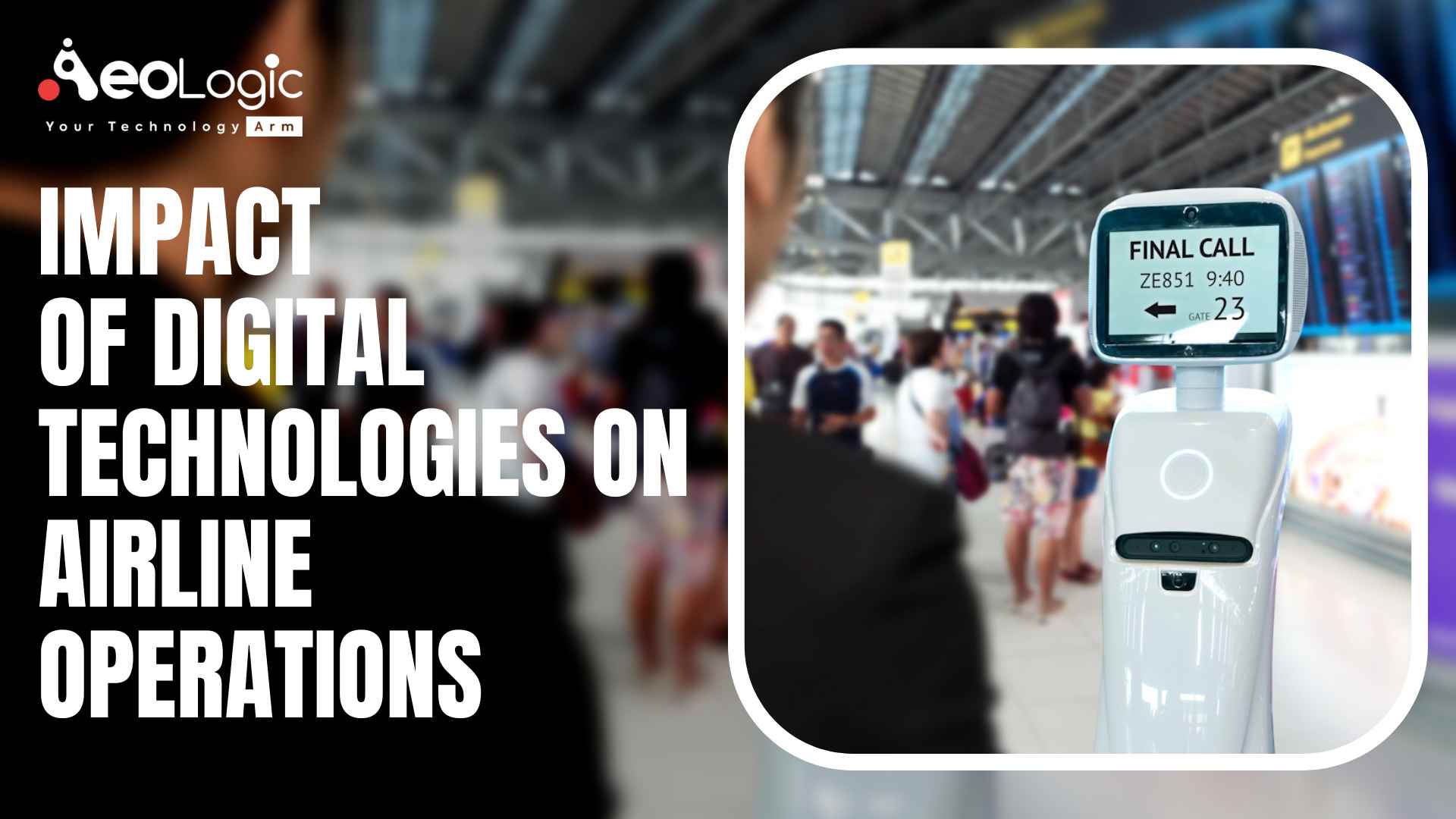Covid-19 and the pandemic have affected all industries to a great degree. Transportation, and more particularly airlines, have been hit hard as most of us have personally experienced. The subsequent effect on airports and all ancillary organizations is yet to be calculated. Emerging Technologies are offering tremendous opportunities for cost optimization and revenue generation. This is the era of Industry 4.0 and the airline industry, and businesses are looking forward to the impact of digital technologies on airline operations.
Also read: Role of Digitalization in Airline Industry
Impact of Digital Technologies on Airline Operations
Strategic digital advancements delivering through a range of airline software and services. It is providing immediate and future-proof advantages to airlines in everyday flight operations. By supporting the responsibilities included at each stage of the flight, airlines can enhance their overall operations. Work operations in the cockpit are becoming highly computerized as a consequence of digitalization. A connected ecosystem of services, apps, and documents that will outline the future flight deck is becoming more reachable to pilots. Pilots can obtain rich, imperative information from a single handheld device. All thanks to targeted applications. The impact of digital technologies on airline operations is a certain way for pilots to reduce their burden. Having the potential to digitally upload briefings or submit reports with a device. That is connecting at the gate, for instance eliminates levels of administration.
Leveraging Digitalization
Digitalization helps in improving operational efficiency as well. Considering specialist apps that are providing situational weather knowledge. Apps that are providing better awareness of the cockpit can assist with more flexible and responsive operations. As well as safer and more economical flight paths, by offering graphically optimized views of market-leading weather information. The reason for reducing such risk is obvious, with aircraft interruptions earlier estimated to cost the airline industry 60 billion US dollars per year. Starting a centralized digital ecosystem for airline application testing is also making it easier for pilots and ground-based operators. Many of them have had to adjust to remote working, for interacting more efficiently.
Higher consistency and communication around flight performance can be accomplished by offering everyone involved in flight operations the same perspective on airline information. Regardless of where they are located.
The impact of digital technologies on airline operations will certainly improve business processes. Having more eyes on the same data, such as through smart fuel tracking, boost the likelihood of identifying problems or opportunities for enhancement.
Similarly, employing digital technologies such as applications suites for cabin staff helps to considerably cut administrative operations. Hence, enabling them to invest more time focusing on passenger service.
Also read: Implementation of RFID in Baggage Operations at Airports
How Does Digitalization Help Airlines Run More Efficiently
Many airlines are acknowledging that a digital transition is crucial to reimagining and rebuilding aircraft operations, flying, and the onboard experience. Therefore, in order to make them more efficient, safer, and more entertaining.

Connecting cabin crew tablets and application-rich cockpits to accessible flight deck connection channels can allow constant data sharing with the ground force.
These benefits can be magnified exponentially when in-flight connectivity is involved. Pilots will be demanding the same level of the network in the air as they have on the ground. And it’s simple to observe why. Those flying with a connected app system are in the best position to receive real-time, persistently formatted. Uplinked updates from the ground, providing them with the most up-to-date and entire picture for decision-making. From real-time weather information, route planning, and air/ground communications to conveying aircraft health data, this has the capability to support them with every element of flying.
Meanwhile, connecting cabin crew devices will be allowing attendants to better interact with ground IT and their coworkers onboard. Improving communication will be empowering attendants for promoting safe and upgraded passenger service. By enabling them to receive connection updates, relay customer complaints, or interact with catering stock information mid-flight. On the ground, enhancing aircraft operations activities, collaboration, and support will need evolving digital applications that can interact with people onboard.
Advancing Digitalized Operations
The impact of digital technologies on airline operations will be leveraging an integrated, connectivity-ready airline application ecosystem. It is providing operators with the flexibility they require to respond to new challenges and demands after COVID-19.
Airlines should cut across numerous disciplines and satisfy best practices in order for flight operations digitalization for delivering on its promises of increased effectiveness, time, and cost efficiency.
Airlines will be requiring partners with the skills for helping them achieve digitization today and in the near future, as well as partners who are always ready to adapt.
Also read: Automated Baggage Handling System Help You in Airports
Closing Thoughts
With this generational transition comes the expectation of integrating technology in all aspects of life, including travel. This will have a considerable impact on how passengers are engaging with airports and airlines, as digital travelers want higher automation and control over every step of their journey.
If you are looking forward to seeing the impact of digital technologies on airline operations, contact us to know more about it.
FAQs
How has digital technology impacted the airline industry?
New technology is revolutionizing air travel across the globe. It is making flights more eco-friendly and efficient. It is helping to enhance security and make flight planning and operations more productive.
Why is digital innovation imperative for airlines?
Airlines are using technology that is empowering employees to deliver better customer experiences. Ultimately, in turn, is driving profitability. However, they shouldn’t be content only to solve today’s concerns. An integrated digital technology strategy is crucial to building the foundation for unique opportunities in the not-so-distant future.









